#The Sands of Iwo Jima
Explore tagged Tumblr posts
Text
Sands of Iwo Jima by Drive-By Truckers might be one of the best songs of all time because it makes me come very close to crying despite the subject matter (the plight of veterans) being something I've experienced through media a million times before and have never been particularly sensitive to.
4 notes
·
View notes
Photo
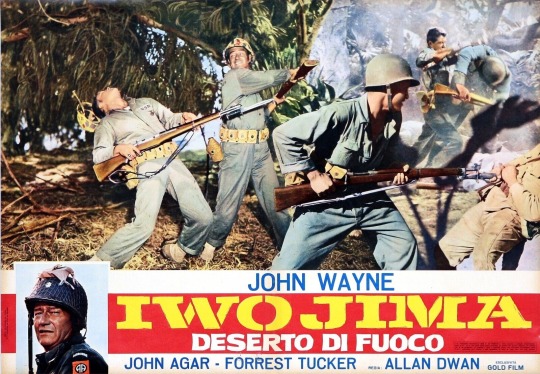
Sands of Iwo Jima, Italian lobby card (fotobusta), re-release 1960’s
25 notes
·
View notes
Text
Iwo was a tough and brutal classroom in which to learn the art of war.
Chuck Tatum, Red Blood, Black Sand
#ww2 history#ww2#the Pacific theater#iwo jima#chuck tatum#the pacific#red blood black sand#reading 2024
6 notes
·
View notes
Text
Review: Sands of Iwo Jima (1949)
Sands of Iwo Jima (1949)
Approved by the Production Code Administration of the Motion Picture Producers & Distributors of America
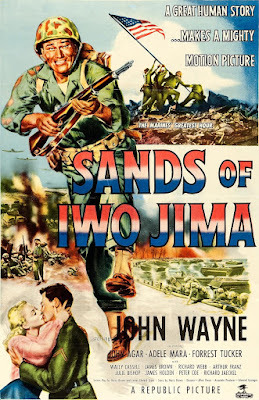
<Originally posted at https://kevinsreviewcatalogue.blogspot.com/2024/12/review-sands-of-iwo-jima-1949.html>
Score: 4 out of 5
In the canon of Movies That You Watch With Your Dad, Sands of Iwo Jima is one of the big ones, referenced as such by everything from King of the Hill to NCIS. That's how I wound up watching it, the first John Wayne movie I've reviewed (though not the first one I've seen; I watched Rio Bravo a long time ago). Last weekend, I went over to my father and his girlfriend's house for lunch, hooked up his old combination VCR/DVD player to their television so they could watch his old movies (it needed an RCA-to-HDMI adapter), used his VHS tape of this film (the colorized version from the '80s, specifically) to see if it worked, and ultimately sat down and watched it with them. It's enjoyed this reputation for a very long time, too, as many of the fathers who shared this movie with their sons first saw it themselves with their own fathers, who were probably around when it first premiered 75 years ago and may have seen it in theaters with their own fathers. And given the themes of this movie, revolving as they do around an authority figure whose stern discipline of the men under his command is ultimately vindicated, I can definitely see the appeal this movie has for dads, even those who aren't veterans, though its unvarnished love for the United States military (the Marine Corps especially) has also undoubtedly boosted its reputation there. What's more, while it's very much a movie of its time, it's also a very well-made war movie with two standout battle sequences and a lot of interesting character moments in between that help set up the drama in those battles, anchored by a great performance by the legendary Wayne in the kind of role that defined his image and got him his first Oscar nomination. It's still a classic, and one I can see enduring for another 75 years among both fathers and the US military.
John Wayne is Marine Sergeant John Stryker, a man with a name out of an action movie, video game, or comic book from the '80s or '90s and a backstory to match (or at least about as much as one could get away with under the Hays Code). He's a harsh commander of the squad he leads, and also a man with personal demons, an alcoholic whose wife left him and took their son and who seems to be taking out some of his issues on his men. Needless to say, his fellow Marines hate him and see him as a tyrant of a squad leader, feelings that Stryker reciprocates as he comes to see the Marines he's in charge of as a green, undisciplined rabble fresh out of boot camp who are dangerously unprepared for battle. It's not much of a surprise to say that, when these Marines face their first actual combat in the Battle of Tarawa, they very quickly realize that Stryker wasn't just a cruel, heartless bastard, but was actually trying to prepare them for the harsh reality of warfare. At Tarawa, the battle-hardened Stryker comes off as the only man in the squad who was actually ready for combat, while the men under his command make constant errors in judgment that get some of them killed or badly wounded, forcing them to shape up after the battle while on leave in Honolulu before they're shipped back into the meat grinder of the Pacific War, specifically to the famed battle in the title.
For all his public image and reputation as the paragon of mid-century rugged, stoic, conservative masculinity, from both fans of his who celebrate that image and people who are deeply critical of what it stood for then and now (and a reputation that he himself cultivated in his lifetime), Wayne's actual performances had depths beyond that, and this film, despite playing a key role in building that image, was no exception. He may not have had the most range, but he knew where his limits and strengths were as an actor, which allowed him to make the most of his image and occasionally play around with it. Here, Stryker comes across as a man who, the more we learn about him, seems like he threw himself into soldiering as a way out of a broken personal life, coming to see the men he commands on the battlefield as his surrogate family after his wife left him. He is ultimately the good guy trying to do right by his fellow Marines, as evidenced at Tarawa when they have to learn the lessons he tried to teach them the hard way, but he is a flawed leader who, before Tarawa, did little to earn the respect of those men, his alcoholism in particular having gotten him demoted recently and causing him to wind up blackout drunk while on leave in New Zealand, an affair that causes his men to see him as a hypocrite. In this, the comparisons between Stryker as a "father to his men" and a literal dad, especially the idealized patriarchs of the postwar era, become unavoidable. Stryker may know best, but he has to soften up and come to terms with some of his own vulnerabilities if he wants to earn the trust of his men, and not risk another situation like the one at Tarawa where he saw that everything he tried to teach them went in one ear and out the other. He's a hardass with a heart of gold, a more idealized version of Gunnery Sergeant Hartman in Full Metal Jacket whose "tough love" approach does in fact make his men into better Marines in the end but could probably stand to tone it down a bit, if for no other reason than to more effectively teach his men.
As an action film, it's clearly a movie of its time. A ton of unironic postwar 'Merica drips from nearly every frame, which can feel hokey watching it today but is still admittedly enjoyable in its own way, with me being of the opinion that the best propaganda is the kind that is proud and unashamed of the things it is standing for. A message delivered with conviction, as this film does, is a lot more persuasive than that same message delivered halfheartedly. Something that feels a bit more dated nowadays, though, comes in the effects department with the use of archival World War II footage for the battle scenes, a decision that on one hand guaranteed realism but on the other also let you know that Republic Pictures, even on one of its bigger-budget productions, had its roots in a collection of smaller indie studios that are often referred to by the self-explanatory name of "Poverty Row". That said, while the real-life war footage wasn't quite seamlessly woven into the film, it did fit remarkably well, and the action they did shoot for this was very well-done. Tarawa felt like a mess of a battle where the fresh recruits were constantly screwing up and had to be bailed out by an increasingly frustrated Stryker, Iwo Jima by contrast made them feel like a well-oiled machine who had learned how to function as both a unit and as individual Marines, and both scenes did a great job of establishing the lay of the land for the battles and the Japanese soldiers as a credible threat to the Marines.
The supporting cast were all outshined by Wayne, obviously, but they too made for a likable or at least interesting bunch, a group of men who all bring their own baggage to the table and have to overcome it if they want to become better Marines, my favorites probably being John Agar as the arrogant rich kid Pete Conway and Forrest Tucker as the tough guy Al Thomas who has old beef with Stryker. The biggest weakness was probably the romantic subplot with Conway meeting and marrying a woman named Allison in New Zealand. It felt like an afterthought, there simply to put a romantic image on the poster and broaden the film's audience, between the fact that Adele Mara didn't even bother with the accent and the manner in which she almost completely vanishes from the film after that scene. Given Stryker's own history with his wife, some more development there could've helped to flesh out both Conway and Stryker as characters, giving Conway something to fight for and reason to shape up while Stryker hopes that Conway doesn't make the same mistakes in his relationship that he did with his own. Instead, not only do we barely see Allison again, the subject of Conway now being a married man is only rarely broached after the Marines ship out from New Zealand.
The Bottom Line
While it's undoubtedly a movie of its time, Sands of Iwo Jima is otherwise a rock-solid war movie anchored by a Hollywood legend in his prime delivering one of his most iconic performances. It's worth checking out whether you're into history, the military, or action movies, if for nothing else than to see an exemplar of the kind of movie that generations of later American war films would find themselves responding to.
#sands of iwo jima#1949#1949 movies#action#action movies#war movies#world war ii#john wayne#john agar#forrest tucker#adele mara
0 notes
Text
📽️ Sands of Iwo Jima (1949)
A very nice old veteran in my church heard I like war movies and recommended this to me. It really wasn’t a bad story, but it felt like it lasted much longer than it did. There was a lot of really corny dialogue and several unrealistic battle moments. It also kinda ruined the movie for me when I found out that John Wayne never served in World War II, but instead found loopholes in order to stay home and continue to be a movie star. (There are multiple articles on this subject.) So it wasn’t horrible, but it wasn’t that great either.
Sex/nudity: 1/10 (kissing)
Language: 2/10 (hell is used a couple times, IMDb says there is a faint f-word but I don’t think that’s true)
Violence: 3/10 (war violence, nothing too gory)
Overall rating: 3/10
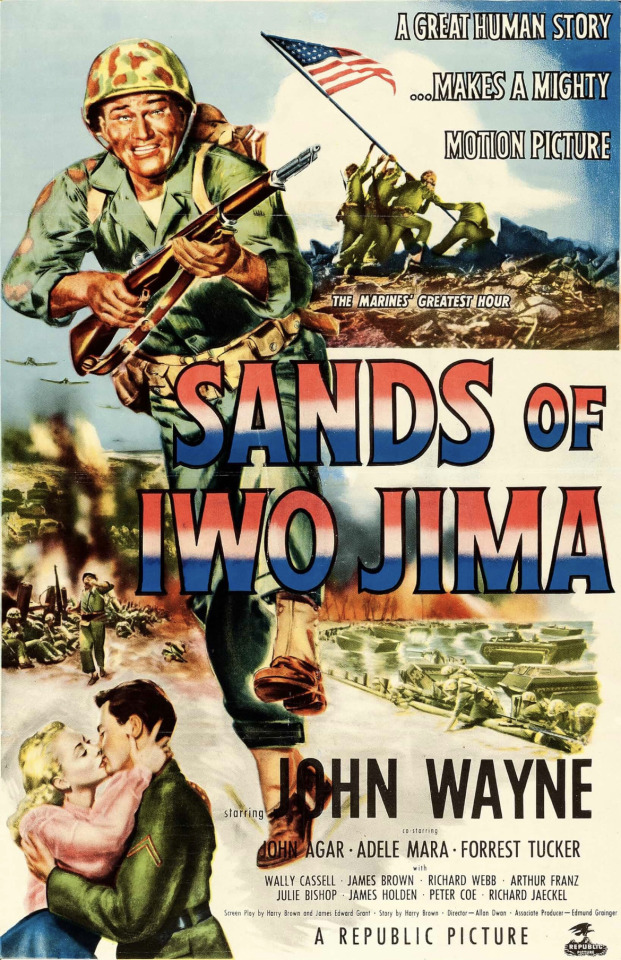
#review#movie#movie review#sands of Iwo Jima#drama#romance#action#war#iwo jima#world war ii#world war 2#second world war#world war second#world war two#john wayne#john agar#adele mara#forrest tucker#james brown#arthur franz#julie bishop#peter coe#richard jaeckel#william murphy#martin milner#david clarke#william hudson#allan dwan#united states marines#united states
1 note
·
View note
Text
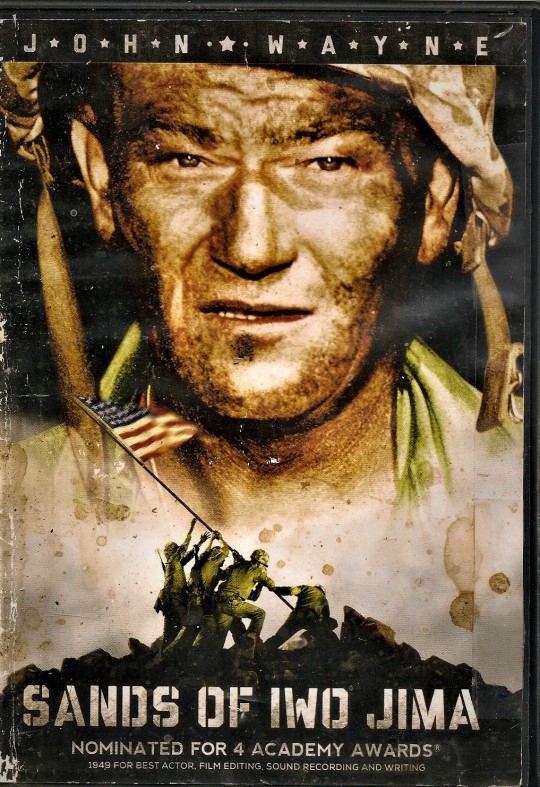
Bad movie I have Sands of Iwo Jima 1949
#Sands of Iwo Jima#John Wayne#John Agar#Adele Mara#Forrest Tucker#Wally Cassell#James Brown#Richard Webb#Arthur Franz#Julie Bishop#James Holden#Peter Coe#Richard Jaeckel#William Murphy#George Tyne#Hal Baylor#John McGuire#Martin Milner#Leonard Gumley#William Self#David M. Shoup#H.P. Crowe#Harold G. Schrier#Rene A. Gagnon#Ira H. Hayes#John H. Bradley#Conrad Binyon#David Clarke#Fred Datig Jr.#Art Dubin
1 note
·
View note
Text
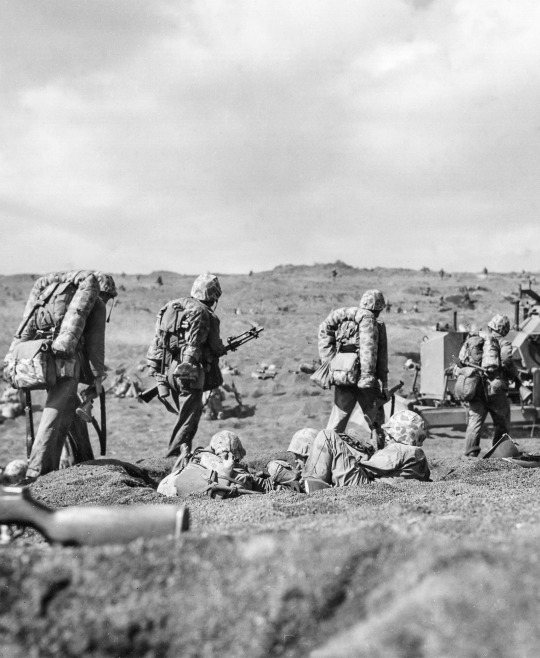
U.S. Marines make their way through the volcanic sand of Iwo Jima, as they steadily push further inland from "Green Beach" in February 1945.
(Official USMC Photograph)
250 notes
·
View notes
Text
Forrest Tucker
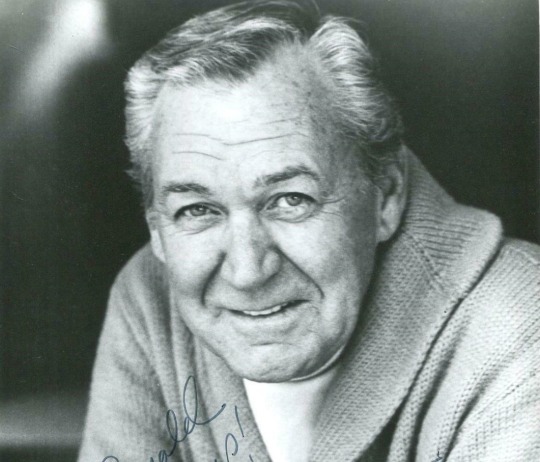
Physique: Average Build Height: 6’ 4" (1.93 m)
Forrest Meredith Tucker (February 12, 1919 – October 25, 1986; aged 67) was an American actor in both movies and television who appeared in over a hundred film and TV productions. He appeared in films like The Yearling, Sands of Iwo Jima and The Abominable Snowman. Tucker is best remembered for his role of Sergeant Morgan O'Rourke on the television comedy series F Troop. Following the run of F Troop, he made a few more films and appeared often on television in shows like Gunsmoke, Marcus Welby, MD, Ironside, Fantasy Island and Love Boat.
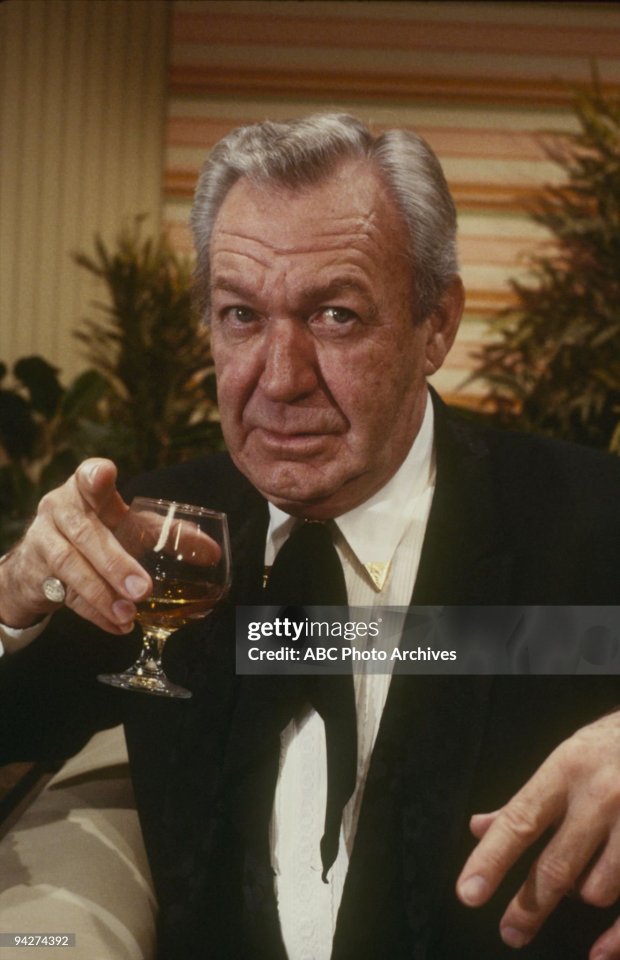
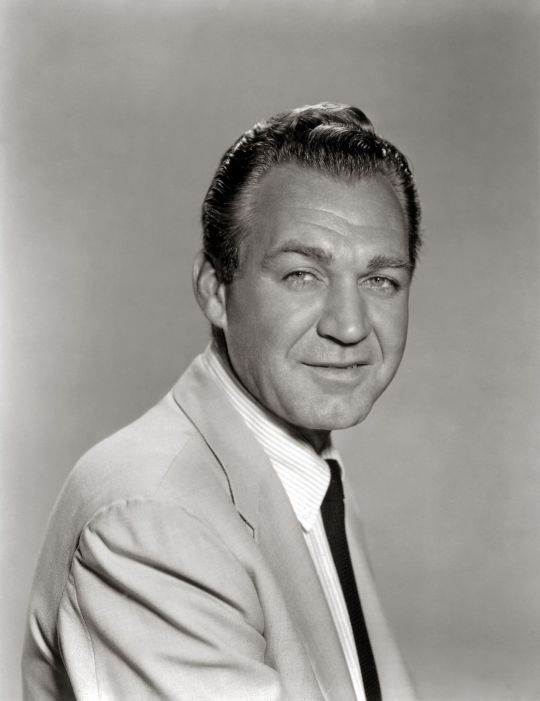
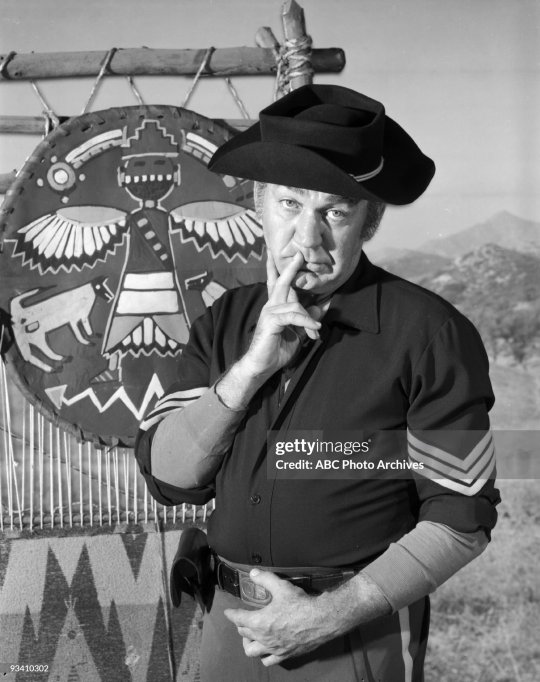
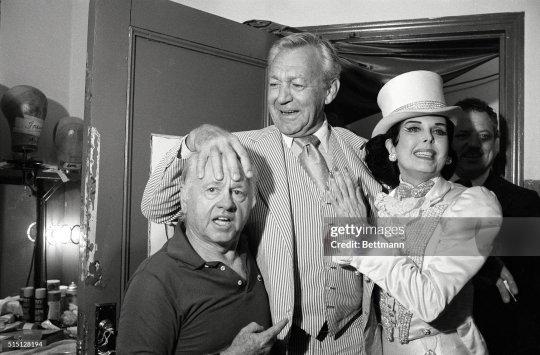
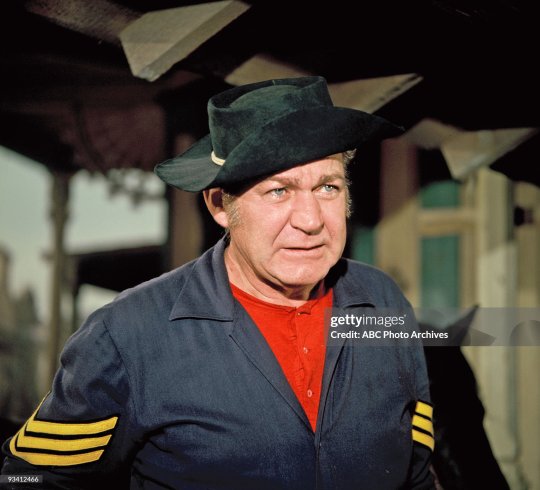
Tall, ruggedly handsome with thick wavy hair and a feature Tucker nicknamed, “The Chief.” A cock that’s comparable to some of the “big guns” of old Hollywood that includes Milton Berle, Frank Sinatra, Sammy Davis Jr., Gary Cooper, Charlie Chaplin and Groucho Marx. I haven’t found any info stating size, but it has to be big from of the shots I’ve seen of him.
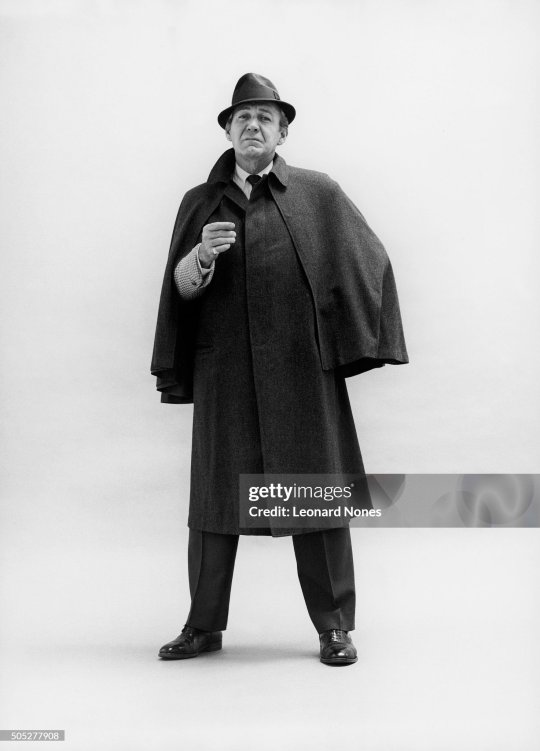
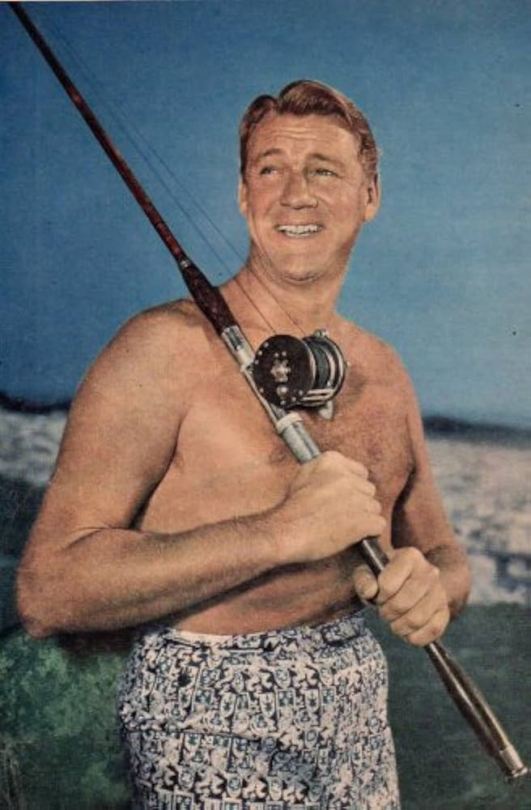
Born in Plainfield, Indiana, Tucker graduated from Washington-Lee High School, Arlington, Virginia, near Washington, D.C., in 1938, and, after joining the United States Cavalry, was stationed at Fort Myer in Arlington County, Virginia. Tucker's film career started well despite a perception in most Hollywood studios that blond men were not photogenic. He enlisted in the Army during World War II. After twenty years spent mainly in Westerns and action roles, he returned to his roots, showing versatility as a comedic and stage musical actor.
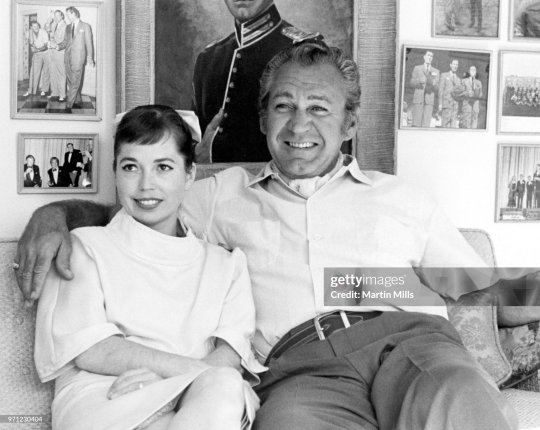
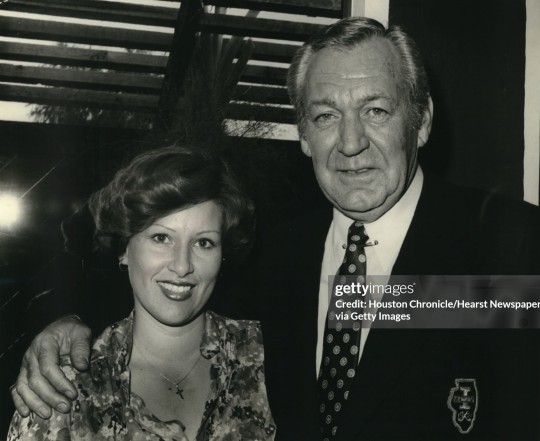
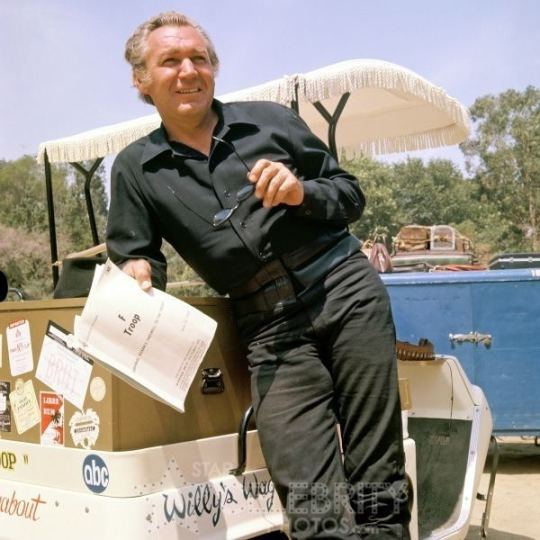
Tucker was married four times, having a thing for young ladies, fathering three children (one by his first wife and two by his third). Hail to The Chief I say! Apparently, Tucker struggled with a drinking problem that began to affect his performances in the later years of his career. Tucker died of throat cancer at the Motion Picture & Television Country House and Hospital on October 25, 1986.
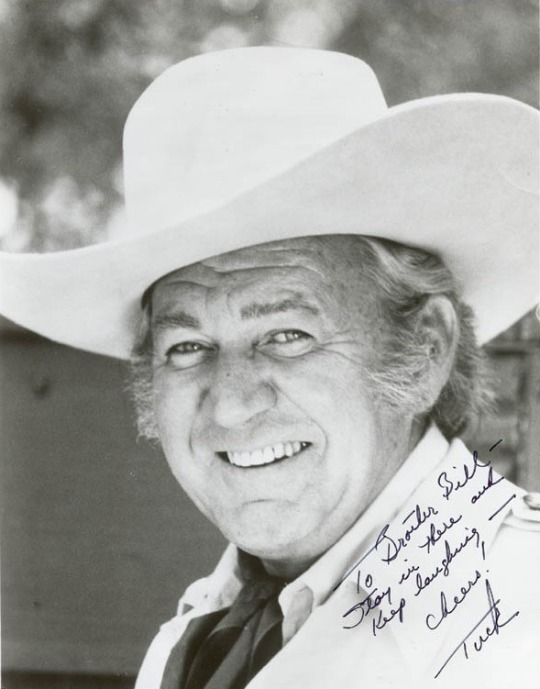
RECOMMENDATIONS: F Troop (TV Series 1965–1967) The Crawling Eye (1958) The Abominable Snowman (1957) Sands of Iwo Jima (1949)
65 notes
·
View notes
Text
For @radiosandribbons especially but here's a list of recs for books by guys in/about/related to The Pacific
The Pacific by Hugh Ambrose, the maps piss me off but it's not a bad read. It can be a bit shallow at times in its coverage of events, it jumps around a fair amount, and it very much reads like a first book but it does have some interesting details.
With the Old Breed by Eugene Sledge, absolutely fantastic read. Highly highly recommend. I personally couldn't put it down for more than 5 minutes at a time and read it in a day.
China Marine by Eugene Sledge, originally meant to be the second half of WtOB when it was going to be called Band of Brothers
Helmet for my Pillow by Robert Leckie, Leckie wrote a great number of books and I can't speak to those but this one is Very Leckie and quite interesting. He called everyone by a nickname to avoid using real names and I assume that's because he wrote it so soon after the war and didn't want anyone complaining about his bitching. Also thank you Vera for all you did to make this book possible 🫡
Islands of the Damned by R.V. Burgin is a great book. Burgie writes very well, his style is straight forward and light hearted often.
Voices of the Pacific by Adam Makos is a bit different, but it's got stories and interviews with a lot of different guys from later in their lives including Sid Phillips. It's got some interesting stuff and while it perspective hops a fair amount it's in a way that makes it easy to read in increments rather than feeling annoying.
We Band of Angels by Elizabeth M. Norman is quite different from the others on this list as it's about the nurses in the Philippines and a bit about the Baton Death March but it's a fascinating read and I can't recommend it enough.
Sid Phillips wrote one called You'll be Sor-ree! That I haven't read, but he mentions in Voices of the Pacific he left a lot of things out of this because he didn't want his kids/grandkids knowing those things and told some of that there instead when he was older.
Chuck Tatum also wrote Red Blood, Black Sand: Fighting Alongside John Basilone from Boot Camp to Iwo Jima and I haven't read that either but his parts in Voices of the Pacific were interesting so I'd assume this is too
61 notes
·
View notes
Text
It occurs to me that a Sole Survivor Shepard might be more sympathetic to Tarquin Victus in ME3 when they land on Tuchanka. They lost their own platoon on Akuze to Thresher Maws, they've been in Vivtus' shoes.
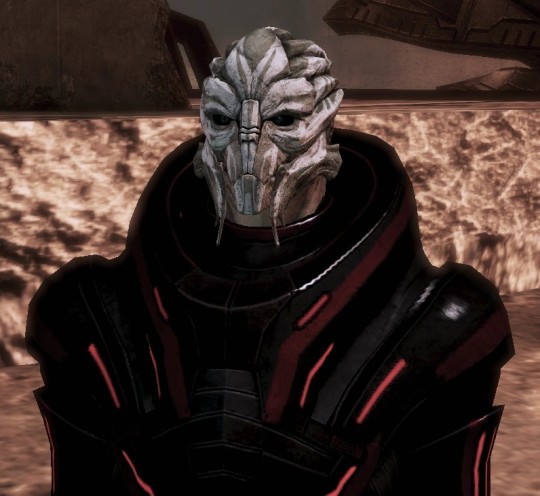
When Lieutenant Victus loses hope, wants to abort their mission, I think Shepard's pep talk comes from deep inside them, for a moment not from Commander Shepard, but Lieutenant Shepard, who watched their men slaughtered, yet fought on.
When Tarquin admits his responsibility for the loss of half his men, a paragon Shepard can tell him.
"Owning your mistake takes guts, but you have to get over it and move on."
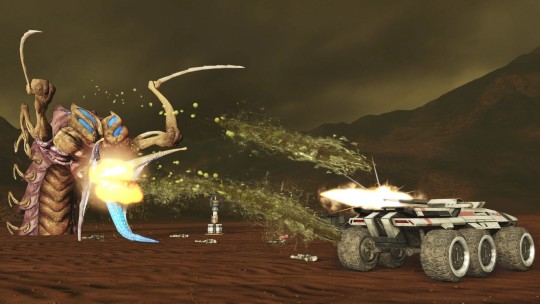
The mission comes first. They have a job to do and quitting now will only mean his men died in vain. They'll mourn later. Shepard learned this at Akuze, that to give up betrays the dead and passed this lesson on to Victus.
In the end it's Victus who's willing to make the ultimate sacrifice in the name of victory. To do right by his family name and perhaps pushed by advice from someone who'd tread that same path.
"All right, saddle up. Let's get back into the war."
-Final line, Sands of Iwo Jima, 1949
15 notes
·
View notes
Text
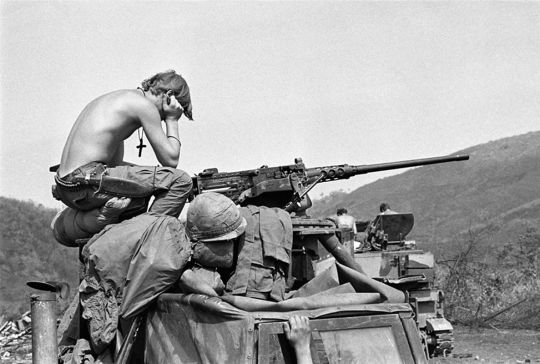
by David Hume Kennerly
* * *
PLEASE DON’T THANK ME FOR MY SERVICE THIS VETERAN’S DAY
NOV 11, 2023
Please don't thank me for my "service." I was in the military, not the "Service." Service is doing something good. Service is what the person does who fixes your car. When the word "service" is applied to the military, it helps to justify violence as a method for conflict resolution. Like "defending our freedom," or "bringing democracy," the word "service" is used to lower the barriers of aggression. The military solution to conflict is death and destruction. That's not "service." Call it what it is - the military. If you have to hurt someone to solve a problem, you are the Problem. -- Arnold Stieber, US Army Veteran, 1970
I have absolutely no problem understanding exactly what Mr. Stieber wrote above, “back in the day,” with the white-hot heat of youth and the thorough pissed-offness of someone who had seen the side of life nobody ever wants to see. It’s the attitude I came home with from that same war, five years before he did.
I’ve never really gotten used to the new tradition of the past 30 years, for civilians - on discovering they are in the presence of someone who served in the military, - to say “Thank you for your service.” I have very mixed emotions about that. On the one hand, it’s nice that maybe a fourth of them have a clue why they’re saying what they are, that it isn’t merely the mouthing of polite words. On the other hand, I’m not sure why anyone would want to thank someone who served in the war I served in, or the ones that followed.
The war in Vietnam made everything in America worse. For just one thing, it harmed the economy when the government adopted a policy of both “guns” and “butter,” which led to the severe inflation of the 1970s, which gave companies looking for any way to reduce costs to start taking a hard line on employee compensation, which leaves us in the condition where the average American working stiff now makes less in terms of buying power than they did 50 years ago, I don’t know about you, but I’m not up to thanking anyone for that.
Of course, thinking further on this leads one to the obvious conclusion that it wasn’t the kids who got drafted who did any of that. They weren’t sitting in the halls of government thinking about how to distract the citizenry from the fact that this particular imperial war was going bad in all ways, and coming up with the idea of keeping taxes down in a period of increased government spending for things that go “BOOM!” while making sure they could get that new car every three years like they always did. Those decisions are the ones that led to the situation I mentioned above. Made by guys who mostly never got shot at, even in the war they did serve in.
In my experience during my time in the Navy and the years after knowing other vets and working with them, there were very few of us who “wanted” to go to war. Most of my fellow sailors were in the Navy because they figured joining the Navy and getting trained for a good job and “seeing the world” beat the daylights out of being in the Army, so much so it was worth a couple extra years over the two years a draftee served. Ditto the Air Force. Even the Marines were forced to start taking draftees after 1966, when they ran low on guys who believed what John Wayne told them in “Sands of Iwo Jima.”
As close as anyone got to “wanting” to go was when those of us who had joined before the war received the first orders sending us to the war. As my friend Phil Caputo wrote in “A Rumor of War” (a “Vietnam book” you should read), when he learned he and his fellow Marines were headed to DaNang in South Vietnam in 1965, “I thought to myself that when it was over and I went home, I’d be able to look my Tarawa-veteran father in the eye.” I know many others - including me, son of the guy who survived the Kamikazes - the sons of the “greatest generation” who had grown up with all the stories about our father’s “good war,” who “played war” with the cast-off gear from that war, who had similar thoughts.
Vietnam was the last war fought with draftees, and you can bet your bottom dollar today’s leaders will never go back to that system. The draft made everyone think about the war, whether they had to worry about getting drafted out of whatever working class job they had (or didn’t have); even the kids with student deferments had to think about the war when they didn’t work hard enough to keep their grades up and maintain their 2-S status. Mothers and fathers and aunts and uncles and brothers and sisters and friends all had to worry about someone they knew and loved going off to that war. Whether they “supported the president” or came to understand that the war wasn’t worth the loss of that life they knew and loved, they came in the middle of the night to hate the war. And eventually that made itself known in politics. The makers of war became constrained in the war they could make by the lack of support from those who gave them their jobs with their votes.
I’ll tell you something. After I came back, I did all I could to end that draft. But I would be very happy to see it brought back today.
No deferments. The sons and daughters of the rich serve right alongside the sons and daughters of the poor - like they did in World War II. It’ll make the entitled little shits into something better. And it really does unify - it’s hard to hate people you know by name.
But mostly I’m in favor of that because it makes it almost impossible for “They” to decide to fight a 20 year war in Afghanistan, or Iraq. They can’t do it because too many people will be paying attention. And getting pissed off at them. And voting.
But no, for exactly the reasons I am for the draft, the “all-volunteer” army is here to stay. You can’t fight 20-year wars in hellholes nobody knows without it. That way, only about 1-2 percent of the population ever has to think about the war - the kids who join up because they don’t have a future that looks better than what the military offers, their families, their friends - not a big enough group that if they got upset they could muster any political changes, unlike all those folks 50 years ago.
Most of all, if you’re going to thank me or any of us for our service, don’t try to honor us as “heroes.” For one thing, most of us aren’t, and for another, if you haven’t been in the military you really have no idea what being a hero in that context actually is.
It’s not what you think it is.
An old Navy Chief once explained “being a hero” to me: “When you’re so terrified that your brain is so frozen you can’t think, and you’ve pissed your pants and shit your drawers, and you just know you’re going to die, and you still do your job - THAT is being a hero.”
Not the definition too many in our society nowadays want to hear.
“But, Tom,” you say, “don’t you write all these best-selling books about wars and heroes? You must really love war to think about it so much.”
If you have gotten anything even remotely like that from reading any of my books, you really need to reconsider that decision not to take that remedial course in reading comprehension.
Yes, I do honor those out there in the mud and the blood and the ooze. And I appreciate knowing the ones who were out there in the mud and the blood and the ooze and survived to come back to the world of the living. That’s because their willingness to do that has a lot to do with why there is that world of the living to come back to.
Or at least that’s true in the World War II books. That’s the last war that could be divided into the Good Guys and the Bad Guys.
Except it kind of can’t. I’ve known too many guys who served on “the other side” who are just as nice - if not nicer - than anyone I have met from “the good side.”
In fact some of them must be better than anyone who served on this side. That’s a small list. But every guy who served in Vietnam and then had the opportunity to later meet the people they were trying to kill at the time, has met people who have been willing to forgive them for My Lai and Agent Orange and Rolling Thunder and all the rest of it, and offer friendship. And the ones on that side who I have been privileged to meet are definitely honorable men.
A late friend of mine who was a leading ace in “the good war” once told me when we were at a convention of those guys and the honored guests at the event were the guys who they’d been out to kill: “The secret nobody knows is, we always thought the guys we were fighting were the only ones who knew what we were going through. We actually thought we were closer to them than to the other people who were on our side.” I’ve heard similar sentiments from former infantrymen as well as former fliers, so it’s not some “guild of the elite” or “honorable brotherhood.”
Although it probably is an “honorable brotherhood.” The brotherhood of people who were willing to do what it took to defend what they loved - and believe it or not that even applies to the Germans; most of them knew as much about the “larger issues” going on, the terrible things, as any young guy in the US military did in the war I fought. And when they did find out, they were shocked too. The people who did the terrible things tried to keep them secret from everyone else, because they knew they were doing terrible things.
My friend Jim Wright, who’s become well-known in social media in recent years for some straight-shooting talk from a retired Chief Warrant Officer, wrote:
“Mostly we veterans are just people who came when called and did our best under terrible circumstances.”
I’ll end with a quote from a guy who did know what it took to do all that stuff:
“Every gun that is made, every warship launched, every rocket fired signifies in the final sense, a theft from those who hunger and are not fed, those who are cold and are not clothed. This world in arms is not spending money alone. It is spending the sweat of its laborers, the genius of its scientists, the hopes of its children. This is not a way of life at all in any true sense. Under the clouds of war, it is humanity hanging on a cross of iron.”
― Dwight D. Eisenhower, Soldier, General, President
[TCinLa :: Thats Another Fine Mess]
#war#the draft#history#Vietnam#soldiers#veterans#thank you for your service#the military#the military industrial complex#Dwight D. Eisenhower#TCinLA#Thats Another Fine Mess
21 notes
·
View notes
Photo
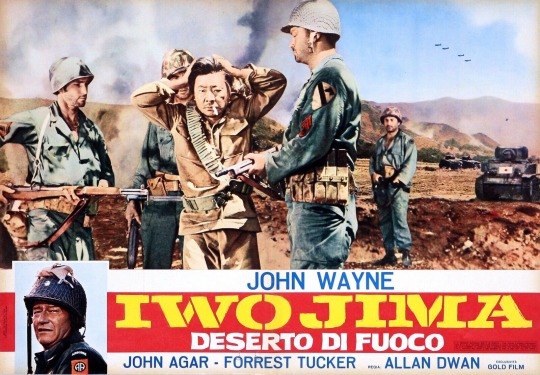
Sands of Iwo Jima, Italian lobby card (fotobusta), re-release 1960’s
2 notes
·
View notes
Text
Armed with simple field dressings and infusions of whole blood, they tried to stem the tide of human suffering and life's blood pouring into Iwo's lava hide.
Red Blood, Black Sand by Chuck Tatum
1 note
·
View note
Text
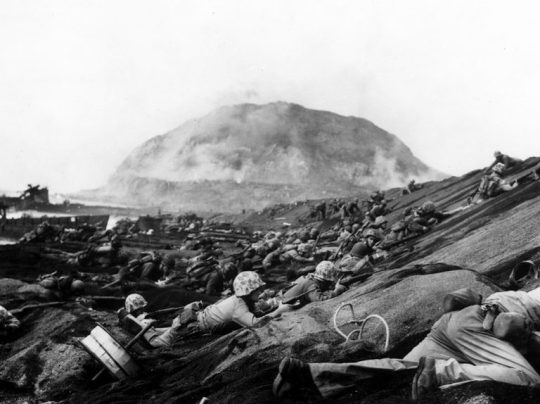
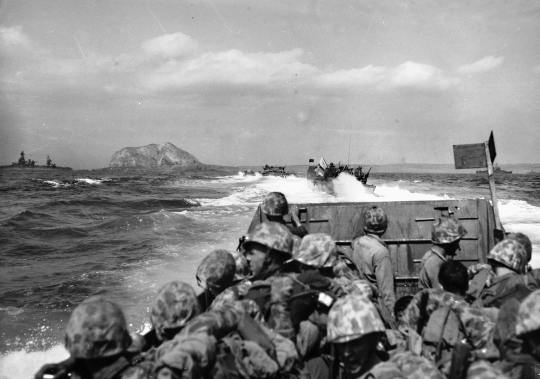
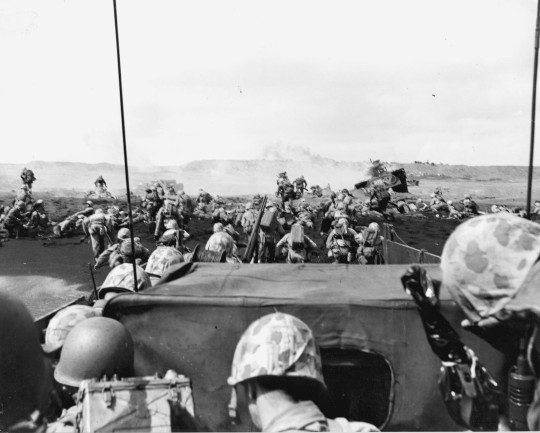
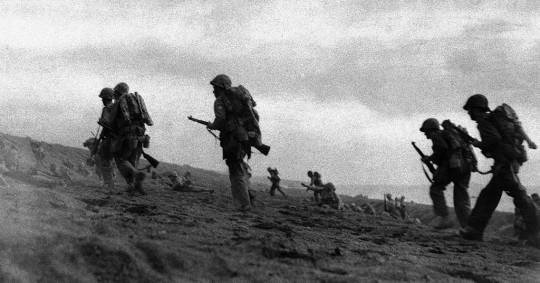
Beginning on 19 February, the invasion of Iwo Jima, or Operation Detachment, was an amphibious invasion aimed at capturing the two airfield present on the island, however, it is often argued that the invasion was not worth it, and an almost pointless endeavor. The Japanese had laid out extensive defensive networks across the entire island, and had pre-sighted the only suitable landing beach. The fine, volcanic sand of the beach made it incredibly difficult to move anything inland, personnel included. Japanese holdouts would hide in the extensive cave networks of the island for months after the battle ended.
7 notes
·
View notes
Text
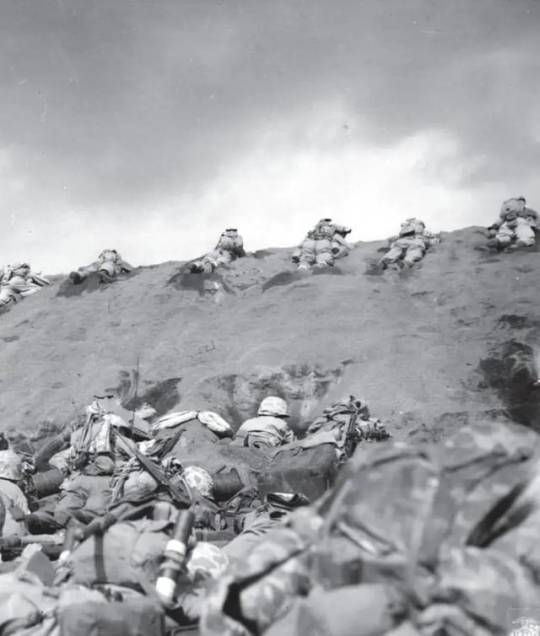
Marines of the 5th Division inch their way up a sand dune on Red Beach No. 1 toward Mount Suribachi, as the smoke of battle drifts over them during the initial invasion on Iwo Jima, on February 19, 1945
30 notes
·
View notes
Text
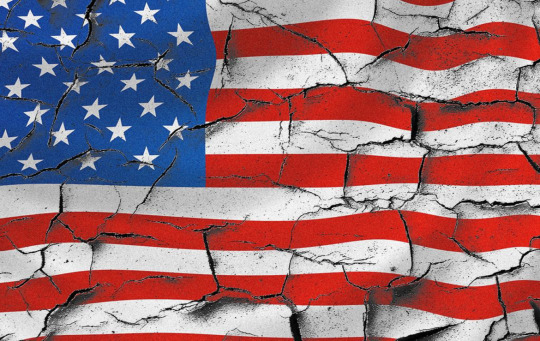

Governor Ronald Reagan, in his 1967 inaugural address, famously remarked, “Freedom is a fragile thing and it’s never more than one generation away from extinction.”
Reagan today might have expanded on his theme by declaring that civilization itself is both fragile and can lost by a generation that recklessly spends its inheritance while neither appreciating nor replenishing it—if not ridiculing those who sacrificed so much to provide it.
Such is the noxious epitaph of the Baby Boomer generation that is now passing after a half-century of preeminence and whose Jacobin agendas have nearly wrecked the nation they inherited.
In contrast to them, eighty years ago this week, the Allied powers of World War II—chiefly the United States, the United Kingdom, and Canada—landed on five Normandy beaches to begin what Gen. Dwight Eisenhower, supreme commander of the Allied expeditionary forces, would call the great “crusade” to liberate Western Europe from four years of brutal Nazi occupation.
The plan was to land within a few hours and in stormy weather well over 150,000 Americans, British, and Canadians on the Atlantic Coast beaches of France, where they were to charge directly into the fire of tens of thousands of enemy troops. They were to charge uphill in the sand while being fired upon by entrenched German troops occupying the hills above. From there, the beachhead was to serve as the launching pad for two million more troops, who were to somehow drive eastward through France and into Germany to end the war and the devastation the Third Reich had inflicted on the world.
All that was accomplished in the ensuing 11 months. That can-do American generation assumed that impoverished teenagers emerging from the Great Depression, with equipment often inferior to their seasoned German enemies, would, over the ensuing months, surely prove able to route Waffen SS veterans. Many of them were hastily transferred from the murderous Eastern Front, such as the nihilist 2nd SS Panzer Division das Reich (“The Empire”). No matter, the Americans did the impossible in less than a year—from the Normandy beaches to well across the Rhine River.
That same generation went on to save South Korea, build an anti-totalitarian world order, defeat Soviet communism, and pass on to the Baby Boomer generation the strongest economy, military, and political system in history, or, to paraphrase the poet Horace, “monuments more lasting than bronze.” Or so we, the inheritors, thought.
And what are the now septuagenarian and octogenarian children of the veterans of Omaha Beach and Iwo Jima, leaving as their own legacy?
The self-infatuated and do-your-own-thing generation that gave us the Sixties and the counterculture has left the country $36 trillion in debt, now borrowing $1 trillion nearly every three months. Worse, there is not just no plan to balance budgets, much less to reduce the debt, but also no intention to stop or even worry about the borrowing of some $10 billion a day.
The U.S. military is almost unrecognizable to that of just a few decades ago. It was humiliated in Kabul. In surrealistic fashion, it abandoned some $50 billion in lethal weaponry to the Taliban—along with our NATO allies, American contractors, and loyal Afghans. And our supreme command labeled that rout a brilliant retreat. Meanwhile, the military suffers from depleted inventory of key munitions while being short 45,000 annual recruits.
The Pentagon is torn by internal dissension over DEI, woke, anti-meritocratic promotions, and a politicized officer class—well, apart from now also being outmanned and outgunned by the Chinese. Many of the world’s key maritime corridors—the Red Sea, the Straits of Hormuz, the Black Sea, and the South China sea—are apparently beyond our navy’s ability to ensure the world safe transit.
For perceived cheap political advantage, the Baby Boomers destroyed the southern border, most recently allowing in nearly 10 million unaudited illegal aliens. With the disappearance of our national sovereignty, so too was lost the once-cherished idea of a melting pot of legal immigrants arriving in America longing to assimilate, to integrate in self-reliant fashion, and to show gratitude for the chance of something far better than what they left.
The country’s major cities are increasingly medieval, with a million homeless camped on fetid streets. Criminals terrorize the law-abiding. They assume their violence will be contextualized away by vacuous “critical legal” or “critical race” or “critical penal” theories. This generation releases violent felons to prey on the weak and sheds hardly a tear as police officers are shot unnoticed at the rate of nearly one a day.
America’s once great universities—such as Harvard, Yale, Princeton, Stanford, and MIT—are now into their fourth year of abolishing much of their prior standards. The youth who sought to wreck them from the outside in the 1960s now succeed in finishing the job as elders on the inside. These bankrupt campuses now adjudicate admissions and hiring by race, tribe and gender and then wonder why their students are entitled, ignorant, and arrogant yet unable to meet the very standards that the universities once insisted were critical to ensuring their preeminence.
Worse, the more elite the campuses, the more they became hotbeds of unapologetic anti-Semitism, gratuitous violence, and hatred for the country’s very institutions that guarantee their own freedom of action and speech. Who taught them and allowed them to think that as they illegally occupied buildings, defaced and defiled monuments, and shouted Jew hatred, they were absurdly entitled to free food deliveries and amnesties?
A rapacious higher education welcomed in profitable anti-American students and billions of dollars in hostile foreign cash from those who mock the laws of their host and feel a covetous America can be bought for 10 cents on the dollar. And as we learned after October 7, they were mostly correct.
Abroad, our nomenklatura opportunistically demonizes a democratic Israel trying to fight a terrorist Hamas that slaughtered 1,200 mostly unarmed citizens at a time of peace in the most grotesque fashion of the 21st century.
Yet our elite cannot distinguish killers from our democratic allies. Hamas deliberately drafted their own citizens to serve as shields to protect the terrorists safely ensconced in the tunnels below—on the sick assurance that Israel would surely try to avoid killing civilian shields whom the cynical Hamas apparat deliberately exposed to protect itself.
America hectors its most loyal ally in a way it does not its chief enemies, communist China and theocratic Iran. Not content with hiding its role in birthing the gain-in-function COVID-19 virus, now with impunity China helps kill 100,000 Americans a year through the export of fentanyl. It sends nearly 30,000 adult males into the US illegally. It relies on the espionage abilities of its students and visitors —and apparently exempt spy balloons—to ensure the People’s Liberation Army’s technological parity with the U.S.
But the greatest baleful legacy of this fading generation is the weaponization of the government against its own perceived American citizen enemies. That bastardization of institutions extends now to the very destruction of the once-hallowed tradition of American jurisprudence.
The degeneration was not just that our government and its political ancillaries cooked up the Russian collusion hoax that warped the 2016 campaign and crippled a presidency—but that, to this day, its unapologetic architects remain smug that they pulled it off and would do it again.
Ditto the efforts of “intelligence authorities” to delude the American people about “Russian disinformation” and the Hunter Biden laptop. The Sixties generation’s new normal is to impeach a president twice, to try him as a private citizen, and to seek to remove him from state ballots.
All that was now characteristic of a generation that learned in the 1960s that if it did not get its way, it would wreck what it could not control. So, it was logical that it sought to pack the court, to end the filibuster, to destroy the Electoral College—and to corrupt the law to achieve political ends. Or as the Sixties generation taught us, “by any means necessary”—an arrogant affirmation of Machiavelli’s dictum that “the ends justify the means.”
Now we are left with a final toxic gift from this generation: the destruction of jurisprudence, a system designed not to easily protect the popular and admired but those often pilloried in the public square, the unorthodox, eccentric, and unliked.
Even Trump’s antagonists know that had Donald Trump been a man of the left, or had he not run again for president, he would never have been charged, much less convicted, of felonies or been punished with nearly a half-billion dollars in legal fees and fines.
We all accept that the charges brought against him by a vindictive and left-wing Letitia James, Alvin Bragg, Fani Willis and Jack Smith—all compromised by either past politicized prosecutorial failures or boasts of getting Trump—have never before been brought against any prior political figure or indeed any average citizen. They were instead invented to target a single political enemy. So what hallowed law, what constitutional norm, what ancient custom, or what Bill or Rights has the fading left not destroyed in order to erase Donald Trump from the political scene?
There is now no distinction between state and federal law. Once a prosecutor targets an enemy, he can flip back and forth between such statutes to find the necessary legal gimmick to destroy his target.
Statutes of limitations are no more as errant prosecutors and political operatives in the legislature can change laws to dredge up supposed crimes of years past, to destroy their political enemies, by employing veritable bills of attainder.
The very notion of an exculpatory hung jury depends on who is to be hung.
Judges can overtly contribute to the political opponents of the accused before them. Their children can profit in the tens of millions by selling to politicos their relationship to the very judge who holds the fate of their political opponents in his hands.
In sum, the First Amendment guaranteeing the right of the defendant to free speech is now not applicable. Asymmetrical gag orders are.
The Fourth Amendment is now torn to shreds by those who boast of “saving democracy.” When the FBI, on orders from a hostile administration, storms into the home of the leading presidential candidate and ex-president’s home, armed to the teeth, treats a civil dispute as a violent felony, and then doctors the evidence it finds, then constitutional insurance against “unreasonable searches and seizures” becomes a bitter joke for generations.
The Fifth Amendment’s protection that no person “shall be deprived of life, liberty, or property, without due process of law” has been destroyed when an ex-president cannot summon expert legal witnesses to testify on his behalf and when he cannot bring in evidence that contradicts his accusers. There is no due process when one ex-president is indicted for the very crimes his exempted successor has committed.
The Sixth Amendment’s various assurances are now kaput. No one believes that Trump was tried “by an impartial jury of the State”—not when prosecutors deliberately indicted him in a city where 85 percent of the population voted against him and are by design of a different political party.
No longer will an American have the innate right “to be informed of the nature and cause of the accusation; to be confronted with the witnesses against him; to have compulsory process for obtaining witnesses in his favor” when Donald Trump was never informed by prosecutor Alvin Bragg of the felony for which he was charged, with little advance idea of all the hostile prosecutorial witnesses to be called, and with no right to call in experts to refute the prosecution’s bizarre notion of campaign finance violations.
The Seventh Amendment is likewise now on the ash heap of history. The publicity-seeking judge Arthur Engoron, a political antagonist of Trump, warped the law in order to serve as judge, jury, and executioner of Trump’s fate, without recourse to a jury of even his biased New York peers.
The Eighth Amendment will offer assurance no longer to the American people that “excessive bail shall not be required, nor excessive fines imposed, nor cruel and unusual punishments inflicted.”
Donald Trump was fined $83.3 million in the E. Jean Carroll case for an alleged assault of three decades past, brought by partisan manipulative waving of the statute of limitations, with the politicized accuser having no idea of the year the assault took place, with her accusations arising only decades later when Trump became a political candidate, with her own employers insisting she was fired for reasons having nothing to do with Donald Trump, and with her narrative eerily matching a TV show plot rather than any provable facts of the case.
By what logic was Trump fined $175 million for supposedly inflated asset valuation to obtain a loan that was repaid with interest to banks that had no complaint? Since when does the state seek to inflict such “unusual” punishments for a crime that never before had existed and never will again henceforth?
In sum, our departing weak-link generation leaves us this final Parthian shot— that when a toxic ideology so alienates the people who are rising up to prevent its continuance, then the desperate architects of such disasters can dismantle the rule of law to destroy its critics.
And so, a single generation has broken apart the great chain of American civilizational continuance. But if this weak-leak generation thinks the evil that they wrought is their last word, they should remember the warning of a great historian:
“Indeed men too often take upon themselves in the prosecution of their revenge to set the example of doing away with those general laws to which all alike can look for salvation in adversity, instead of allowing them to subsist against the day of danger when their aid may be required.”
– Thucydides 3.84.3
3 notes
·
View notes